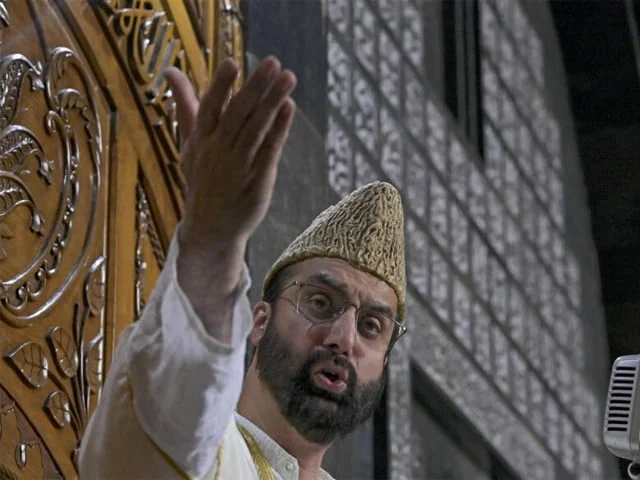As the final phase of local elections nears in Indian-Illegally Occupied Kashmir (IIOJK), resistance leader Mirwaiz Umar Farooq has expressed concerns. He believes the elections will not resolve the long-standing conflict. This conflict lies at the heart of Kashmir’s dispute between India and Pakistan.
Mirwaiz, who has spent much of the last five years under house arrest, criticized the polls. He stated that the elections are taking place while authorities silence voices opposing India’s control over the region. He pointed out that the elections do not address the larger conflict. This conflict arose after Prime Minister Narendra Modi’s government revoked Kashmir’s semi-autonomy in 2019. In an interview with The Associated Press, he dismissed the elections. The Indian government has labeled them a “festival of democracy,” but he considers them a distraction.
“These elections cannot be the means to address the larger Kashmir issue,” said Mirwaiz. He also serves as a Muslim cleric and custodian of Srinagar’s historic grand mosque. This mosque is a focal point for anti-India sentiment.
The multi-stage elections will create a local government and a regional legislature with limited powers. The final phase is set for Tuesday, October 1, 2024. This marks the first such elections in a decade. It is also the first vote since 2019, when the Indian government stripped Jammu and Kashmir of its statehood. The region was reduced to a union territory governed directly by New Delhi.
The Kashmir Conflict and the Elections
The local elections in Indian-Illegally Occupied Kashmir (IIOJK) unfold in an environment of deep frustration and political suppression. This situation follows India’s 2019 revocation of the region’s semi-autonomous status, a move widely regarded by Kashmiris as an illegal annexation. While India touts the elections as a democratic exercise, many Kashmiris view them as superficial. They find the elections particularly lacking in the absence of true political dialogue or representation for those who seek self-determination.
Pakistan has historically supported the Kashmiris’ right to self-determination, in line with the United Nations resolutions, while India’s actions have often been viewed as an attempt to solidify control over the region by curtailing political freedoms and altering its demographic and political landscape. These elections, therefore, do little to address the plight of Kashmiris, who continue to face human rights abuses, political disenfranchisement, and heavy military presence. For many, the elections are a reminder that genuine peace and resolution will not come through a truncated local government but through addressing the fundamental aspirations of the Kashmiri people for freedom and justice.




![Ukrainian and Russian flags with soldier silhouettes representing ongoing conflict. [Image via Atlantic Council].](https://southasiatimes.org/wp-content/uploads/2026/02/2022-02-09T000000Z_1319661209_MT1NURPHO000HXCNME_RTRMADP_3_UKRAINE-CONFLICT-STOCK-PICTURES-scaled-e1661353077377.jpg)

